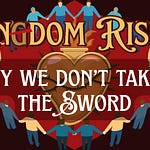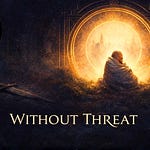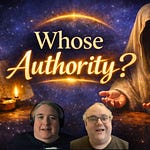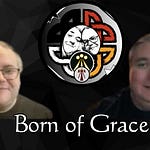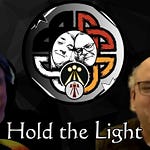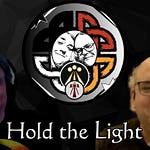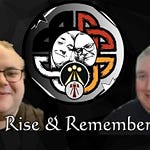Christopaganism is cringe. Or at least, that’s what I’m told now and again. Maybe it is a little cringe to believe in something, to put your trust in Spirit, and to do the work of faith. In a culture that wants everything spoon-fed and easy, Christopaganism doesn’t oblige. It isn’t the kind of path that gets done for you. It’s a living, embodied faith that you make your own. Step by step, ritual by ritual, day by day.
If I could go back, there are five things I wish I had known before I started naming myself Christopagan. These aren’t just private reflections, they’re woven from the questions and confusions that so many of us carry. And the truth is, many of us were already Christopagan long before we admitted it.
The Surface: Incoherence or Wholeness?
The first stumbling block was the accusation of incoherence. Isn’t this just syncretism? A messy mash-up of two incompatible religions? I used to wrestle with that a lot. Raised evangelical, I was drilled on the need for a “cohesive worldview.” Anything less was a sign of error.
But history undoes that fear. The early Israelite religion had a divine council. Christianity developed over centuries out of Judaism. Judaism itself absorbed influences from surrounding cultures. Multiplicity was always part of the tradition. What we now call “religion” is a relatively modern category, invented in the 18th and 19th centuries. For most of human history, faith wasn’t a box you fit into, it was a way of living, a relationship, a cycle of practice and story.
Once I stopped demanding a monolithic voice and started listening for the harmony in many voices, the charge of incoherence melted away. Christopaganism isn’t a contradiction; it’s a continuation of what faith has always been: plural, evolving, seeking coherence in practice rather than in dogmatic system.
The Roots: Belonging and Trauma
The second lesson was about belonging. Many Christopagans wonder, “Do I fit in either world?” Too pagan for Christians, too Christian for pagans, it can feel like an exile. But what I learned is this: most resistance is not about you. It’s about wounds carried by communities.
Many pagans bear scars from Christian family, churches, or cultures that condemned them. When they bristle at your presence, it isn’t you they’re rejecting, it’s the harm they survived. The healing comes not from demanding acceptance, but by showing that you are not that kind of Christian. That you are safe, open, willing to listen.
And for Christians who would ostracize someone for mixing paths? If their concern for “purity of doctrine” outweighs their care for the sick, the poor, the brokenhearted, then they are not the kind of community Jesus pointed us toward. Better to knock the dust off your shoes and walk on.
The Hidden Depths: Woo Woo, Simplicity, and Practice
The third lesson was learning to face the sneer of “woo woo.” It’s a phrase often flung at mysticism, at magic, at embodied ritual. Some of the criticism is fair. There’s a difference between shallow consumer spirituality and the hard, humble work of a living practice. But there’s nothing foolish about seeking a spirituality that breathes, moves, and changes you.
Magic, for example, is not a vending machine. It’s more like Habitat for Humanity: you put in the sweat equity, Spirit puts in the grace, and together something new rises. Prayer, ritual, spellcraft, they aren’t meant to be empty gestures. They are meant to work. They’re meant to change you, and to shape the world around you, even in small and quiet ways.
And here’s what I wish I knew earlier: practice doesn’t have to be elaborate. It doesn’t have to exhaust you. A simple prayer, a cup of tea brewed with intention, a nightly offering to the house spirits—these small acts ripple with power. Consistency matters more than complexity. Faith is not proven by how many tools you collect, but by the fruit that grows in your life.
The Interconnection: Already One
The fourth and most surprising lesson is this: I was already Christopagan. Long before I named it, my life was shaped by myth and saint, by story and Spirit. I read Greek myths for their wisdom. I prayed to Brigid long before I called her Saint or Goddess. I talked to the birds, watched for omens in clouds, felt the Divine alive in nature.
Denial is a river, and I drowned in it for a long time. But the day I admitted what was true, something changed. A deep sigh came over me. The fight was over. The armor cracked. Calm and release came first, followed quickly by joy. Suddenly all the oddities of my life: the quirks, the practices I never had a name for made sense. They belonged. They fit. I had been Christopagan all along.
This is the reassurance many of us need: you don’t become Christopagan by magic words or sudden conversion. You recognize it. You name what was already true. You come home to yourself.
The Center: Living What You Know
So what do we do with this? We trust our instincts but we don’t stop there. We explore, investigate, test all things, and hold fast to what is good. That is what Paul urged, and that is what our ancestors in every tradition have done.
Christopaganism is not about serving two masters. It is about serving the one Source of life, who is God, through many faces and voices. We eat and we drink; we live by ritual and by prayer. The point is not to prove our coherence to anyone else, but to embody love, justice, and reverence for creation.
I encourage you: if you have felt the tug of myth, the pull of saints, the call of earth and Spirit, stop fighting the denial. Breathe the deep sigh. Allow the oddities to line up into a path. You may already be Christopagan, and naming it may give you the courage to walk more freely.
Thank you for Tips / Donations:
Substack: https://www.creationspaths.com/
New to The Seraphic Grove learn more
For Educational Resource: https://wisdomscry.com
Social Connections:
#Christopagan #CreationSpirituality #ChristianWitchcraft #Mysticism #Paganism #Druidry #CelticSpirituality #Magic #ChristianPagan #SpiritualPath
Chapters:
00:00 Introduction - Addressing Misconceptions About Christopaganism
01:03 Host Introductions
02:20 Topic 1: Perception of Incoherence in Christopaganism
09:15 Topic 2: Identity and Acceptance in Both Communities
12:44 Topic 3: Addressing 'Woo Woo' Misconceptions
21:05 Topic 5: Realizing You Were Already Christopagan
28:20 Closing Prayer and Outro






